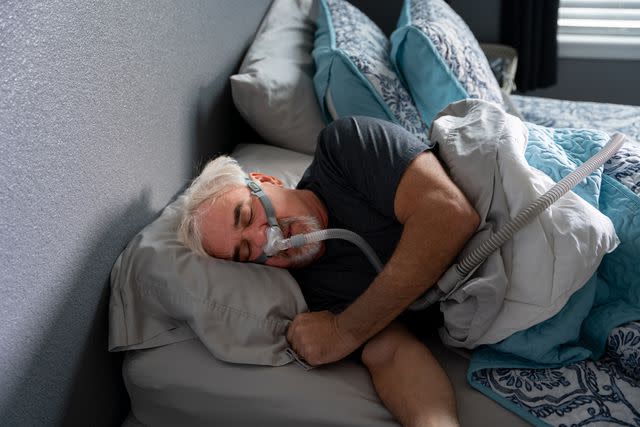Sleeping Fewer Than 7 Hours Each Night Linked to Higher Mortality Risk in People With Sleep Apnea
Fact checked by Nick Blackmer
People with obstructive sleep apnea (OSA) who get fewer than seven hours of sleep each night have a higher mortality risk than those who sleep longer, new research shows.
OSA affects 39 million U.S. adults, making it th emost common type of breathing-related sleep disorder.
Experts recommend consulting a primary care provider if you have sleep issues and suspect they stem from sleep apnea or another condition.
A new study suggests that people with obstructive sleep apnea (OSA) who sleep fewer than seven hours a night have a higher mortality risk compared to those who get more shuteye.
The study, published in JAMA Network Open, found that the association between sleeping less and an elevated chance of dying from any cause—known to researchers as “all-cause mortality”—was independent of the apnea-hypopnea index, a tool that measures how often breathing starts and stops during sleep.
Obstructive sleep apnea is the most common type of breathing-related sleep disorder, affecting 39 million U.S. adults. With obstructive sleep apnea, throat muscles relax and obstruct a person’s upper airway, causing breathing disruptions during sleep.
According to the study’s authors, people who have obstructive sleep apnea and go without much sleep may have a higher chance of having insulin resistance, visceral obesity, and hypertension. These conditions can raise the risk of a heart attack or other dangerous cardiac event.
However, the researchers wrote that “the association between sleep duration and all-cause mortality in OSA” has been “rarely investigated.”

grandriver / Getty Images
How Sleep Duration Affects Mortality for People With Obstructive Sleep Apnea
To fill in the gap, the researchers analyzed information about 2,574 people with obstructive sleep apnea enrolled in the Sleep Heart Health Study, a study that aimed to examine the consequences of sleep-disordered breathing.
Participants, who joined the study between 1995 and 1998, filled out questionnaires and received a polysomnography assessment. Researchers followed up with them for a median of almost 12 years, with 688 participants dying at some point before the monitoring period ended.
The team divided participants into four groups depending on their typical sleep duration: at least seven hours, six to seven hours, five to six hours, or less than five hours. Researchers found that almost 90% of participants typically slept fewer than seven hours a night.
They then compared the risk of death for each group.
Researchers found a strong association between a higher risk of all-cause mortality and sleeping fewer than seven hours a night.
But, they wrote, “further studies would be needed to investigate the health benefits of extending sleep length among people with OSA and short sleep duration.”
Oren Cohen, MD, assistant professor of medicine, pulmonary, critical care, and sleep medicine at the Icahn School of Medicine at Mount Sinai, told Health that the study’s results align with previous research into how sleep duration affects health.
“We’ve known for many years now that short sleep duration is associated with higher cardiovascular risk and mortality,” said Cohen, who is unaffiliated with the study.
Moreover, Cohen emphasized that studies also show that having a sleep schedule that “varies a lot night-to-night” may also raise your risk of cardiovascular disease.
Why Obstructive Sleep Apnea Can Shorten Sleep
Researchers said they don’t know what’s behind the higher mortality risk for people with OSA who get less sleep, but they pointed to two factors that may contribute to the relationship: fragmented sleep and waking up frequently.
People with OSA typically experience both issues, according to Jennifer Acostamadiedo, MD, internal medicine physician and sleep medicine specialist at UCLA Health.
“When the obstruction happens, you don’t get oxygen,” she told Health. “When you don’t get oxygen, your brain thinks you are dying and activates your sympathetic response—stress mode. The brain is going to do anything to keep you alive, and waking you up makes you breathe.”
Of course, she said, this process happens more often for people with severe sleep apnea—defined as more than 30 episodes of sleep disruption per hour.
How People With Sleep Apnea Can Improve Sleep Quality
Experts recommend consulting a primary care provider if you have sleep issues and suspect they stem from sleep apnea or another condition. Your provider can then refer you to a specialist who can diagnose you.
If you have sleep apnea, treatment options range from using a CPAP machine to investing in a better pillow.
Acostamadiedo emphasized that treatment isn’t usually intended to help you hit a certain amount of daily sleep but instead to improve “the quality of the sleep you are getting.”
Cohen said what’s required for optimal, restorative sleep varies from person to person.
“I tell my patients that once the sleep breathing disorder is treated,” Acostamadiedo said, “we will calculate what a healthy amount of good quality of sleep looks like for them.”
For more Health.com news, make sure to sign up for our newsletter!
Read the original article on Health.com.

